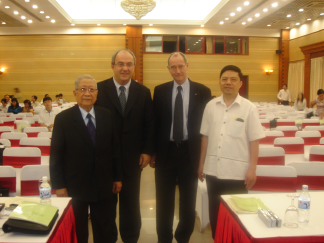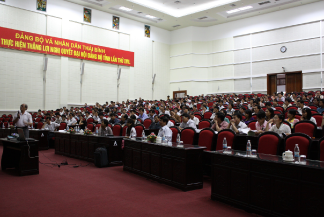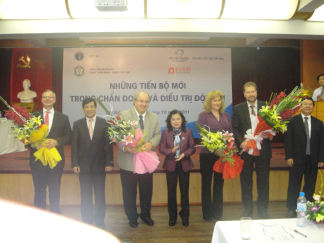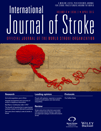WSO Stroke Education Program in Vietnam 2008–2011: 8596 hospital doctors attended in 58 cities and received a certificate from the WSO and the Ministry of Health
In 2008, the start of the World Stroke Organization (WSO) ABC Education Program Stroke Management in Vietnam was reported in the International Journal of Stroke1. Now, the successful ending of this program is reported. Until the end of 2011, the trainings took place in 58 cities and provinces with 8596 doctors participating. The attending doctors received a certificate signed by the WSO and the Ministry of Health in Hanoi, Vietnam. In 2008, there was virtually no structured stroke care existing in Vietnam. Today, stroke is recognized as a separate disease by most doctors. Vietnam has now a National Stroke Society that holds annual meetings and a Vietnamese edition of the International Journal of Stroke. A program endorsing the setting up of stroke units has been endorsed by the government and the stroke society.

The promoters of the program met in April 2008 in Hanoi (from left to write): Professor Le Duc Hinh, Professor Michael Brainin, Professor Bo Norrving, and Professor Vu Van Dinh. Until 2011, 8596 medical doctors had participated in the training program of the WSO which was held in 58 cities and provinces in Vietnam. They are now holder of a ‘Certificate of the World Stroke Organisation (WSO) and the Ministry of Health of Vietnam (MOH)’
The problem
Many regions with provincial hospitals are not well equipped and cope with difficulties to receive updated medical information. In many cases, there is no easy to use internet access. Because of the economic status as a low-income country, Vietnamese doctors rarely have the possibility to join international conferences and access to the leading journals and discussion fora. Therefore, they rarely have the privilege to network with colleagues from other countries.
The aim
Bringing important know-how for the therapy of stroke patients to as many doctors as possible treating stroke patients.
The challenge
Vietnam is a large (about 80 million inhabitants) country with many rural areas.
Parties involved
- World Stroke Organisation
- Ministery of Health of Vietnam, and
- Industry support
Preparation
In 2007, Professor Brainin as a representative of the WSO met the Vice-Minister of Health in Hanoi. The result of this meeting was a ‘Declaration of Cooperation’ from the Ministry of Health to endorse the WSO Program: ABC Management of Stroke'. It was decided that this program should become obligatory for all doctors in all hospitals in all provinces.
STEP 1: train the trainers
One year later, in April 2008, Professors Brainin and Norrving made the acquaintance of the leading neurologists and discussed the program, held the first five lectures of the ABC education program that was rolled out for the following four-years. The lectures were held in three scientific symposia in Ha Noi, Ho Chi Minh City and Hue. The total number of participants were listed as 630.
The participants were local professors and chairs in neurology, intensive care, cardiology, internal departments of different cites and provinces in Vietnam.
STEP 2: train the trainees
In June 2008, the Ministry of Health established an Advisory Board and a list of lecturers including the leading professors and doctors, who were scheduled to give lectures on ‘Principles of Stroke Management’ by using the slides and papers provided by the WSO lead lectures in all provinces and hospitals.
The training package included the ‘4 lectures of the WSO on cardinal stroke treatment’ plus a lecture on ‘General intensive Care in Acute Stroke’ prepared by Professor Van Dinh, chairman of the Vietnam Internsive Care Unit Association.
Until the end of 2011, the trainings took place in 58 cities and provinces with 8596 doctors participating. The attending doctors received a certificate signed by the WSO and the Ministry of Health.
Organization
The Vietnamese Society of Neurology and the Vietnamese Society of Emergency Medicine organized these events with sponsorship from EVER Pharma.
Acknowledgement
Our gratitude goes to Alexandra Dachenhausen, PhD who collected the data and helped write this report. This program has been possible due to an unconditional educational grant from EVER Neuro Pharma.







